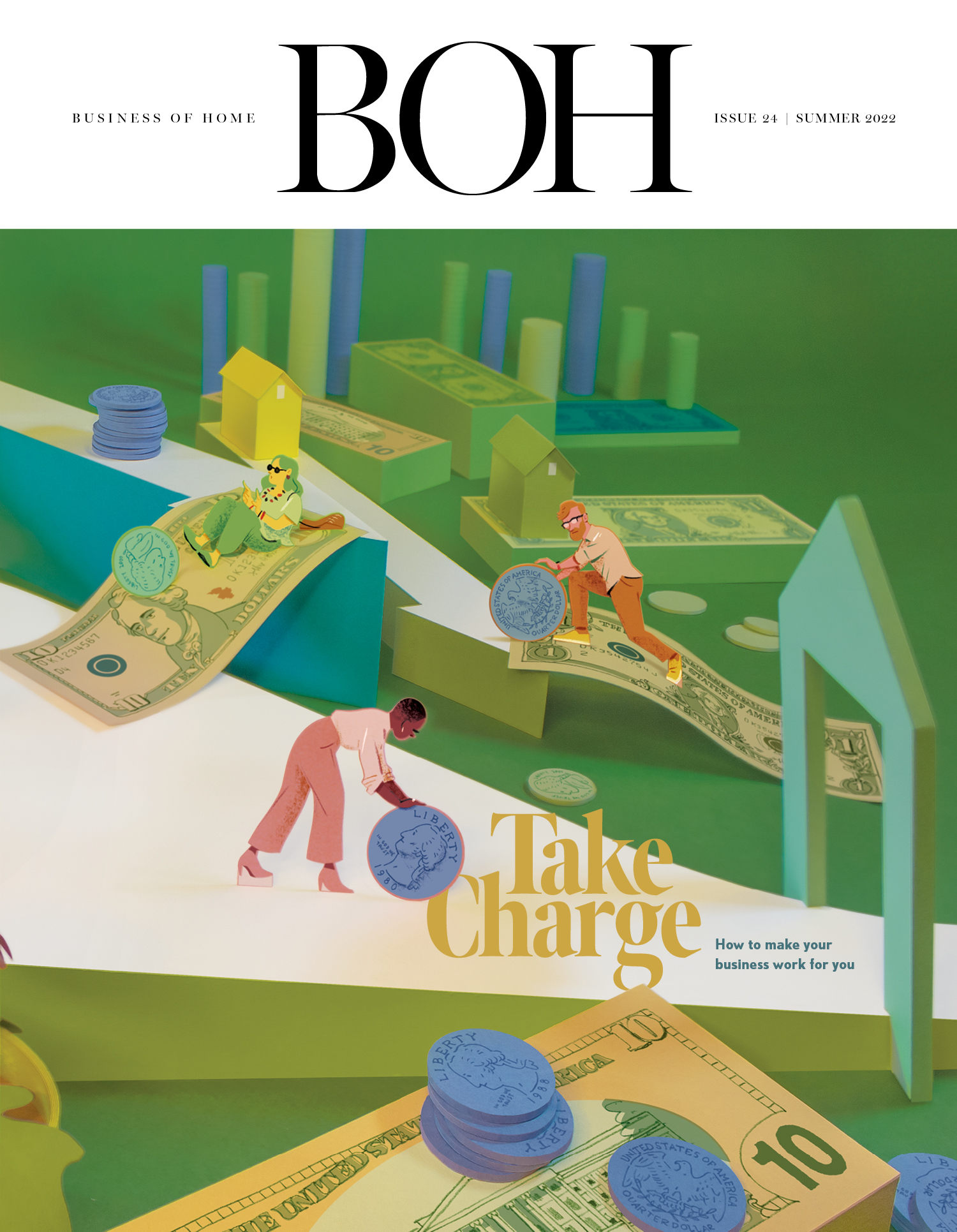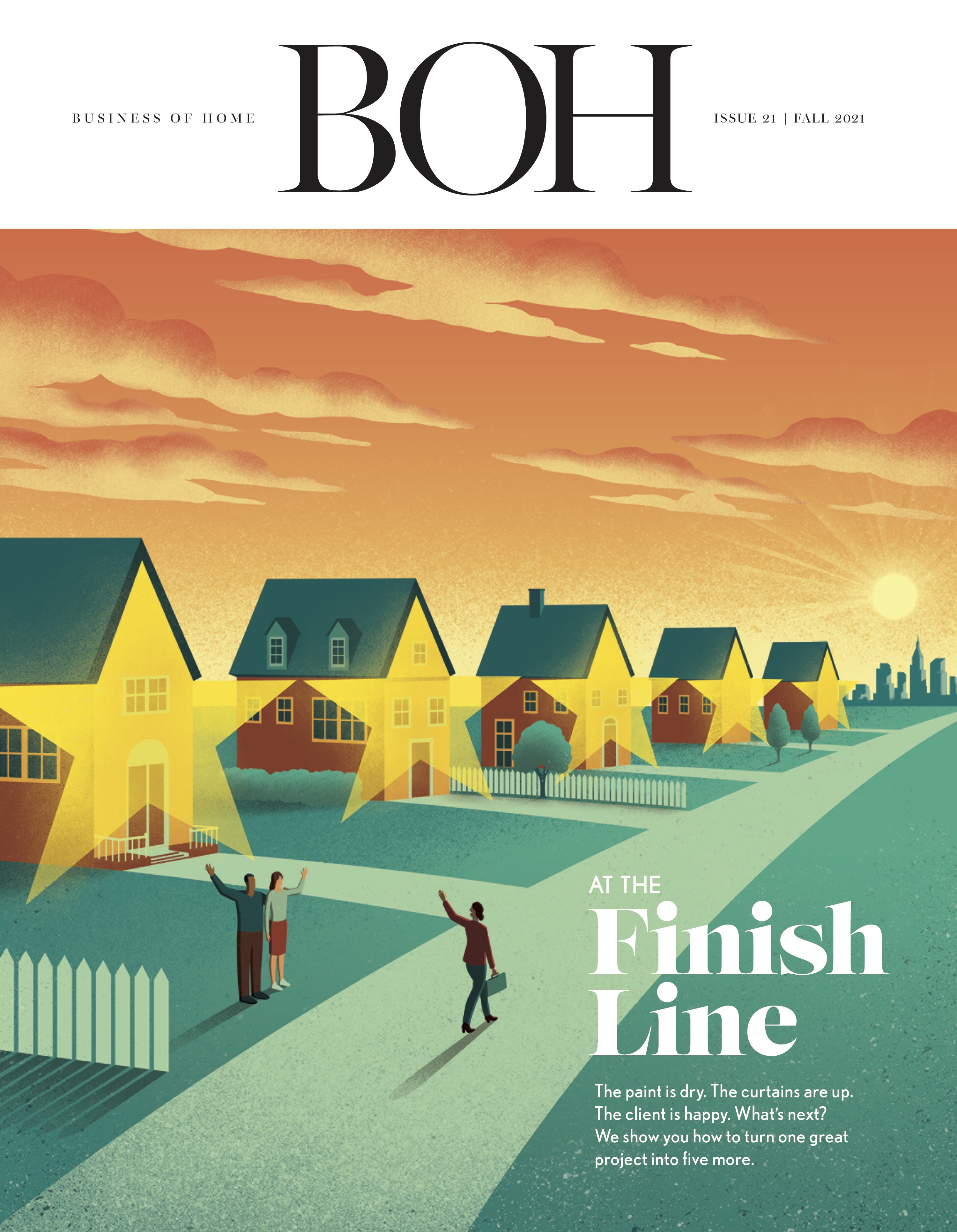In March, Business of Home reported on the struggles of home furnishings e-commerce site Burke Decor. For months, the company had been failing to deliver both orders and refunds, leaving consumers and designers high and dry. At the time, founder Erin Burke provided a statement to BOH stating that, while the company had faced “significant challenges,” it was in the process of addressing them. The business had also hired a restructuring expert who offered encouraging words: “This is not going to be an ongoing situation.”
Three months later, that expert is no longer working with Burke Decor. Meanwhile, the Youngstown, Ohio–based business has been sued for more than $6.4 million by a lender that alleges Burke made “fraudulent misrepresentations” of her company’s financial health. More recently, Erin Burke herself has applied for Chapter 11 bankruptcy protection. Her application, submitted on June 20, claims a debt between $1 and $10 million—and it mingles the founder’s finances with her company’s, listing money owed to corporate credit card providers and a logistics company.
Amid the legal drama, Burke Decor is still failing to deliver both product and refunds to some customers. The company has not provided a clear estimate of how many orders remain in limbo, though online reviews spread out across sites like Trustpilot, Yelp and the Better Business Bureau suggest hundreds of angry customers, and the office of the Ohio attorney general has fielded more than 160 formal complaints against Burke Decor. The lawsuit against the company, filed by a financial services startup called Ampla, estimates customer obligations “in the millions of dollars.”
BEHIND THE SCENES
When contacted by BOH in the spring, Burke pointed to a variety of reasons that her company had struggled over the past year, ranging from tightening lending conditions to search and advertising changes made by Google and Meta. What went unsaid was the impact of these challenges: Burke Decor had fallen behind in payments to suppliers and vendors, hampering its ability to quickly get orders to customers.
A former employee of Burke Decor who spoke to BOH on condition of anonymity described a period starting in 2023 in which the company had to navigate a series of “holds”—manufacturers and shipping companies halting their services due to unpaid invoices. The result was a game of Whac-A-Mole, in which employees struggled to get orders delivered around a chaotic landscape of debt.
Another former employee who spoke to BOH on condition of anonymity shed some light on what amounted to an unofficial company policy for delaying refunds to customers. After asking for their money back, Burke Decor customers would receive a templated email telling them to expect the money in seven to 14 business days. However, behind the scenes, all that had happened was the accounting team had been notified—no funds had been released.
“Are you actually getting the money back in 14 days? Absolutely not,” recalls the employee.
As time wore on and customers became increasingly irate, Burke Decor would promise to “investigate the issue.” In many cases, however, it was not until the customer threatened to sue that the request for a refund was expedited for payment.
MISSING MONEY
In recent months, Burke Decor customers have had refunds delayed in increasingly strange ways. Alexandra Klein, a South Dakota–based Burke Decor customer, is a case in point. In November 2023, she placed an order for two chairs totaling more than $1,800. The chairs were delayed, then delayed again. Finally this spring, she canceled the order and asked for her money back. Burke Decor sent her a check. It bounced. On closer examination of the check, Klein realized VOID was faintly stamped on it—the company had sent her a voided check.
“They were acting so customer servicey at the beginning,” she says. “Then as soon as I reached out and told them the check had bounced, they ghosted me and stopped responding to emails.”
Klein’s experience receiving a voided check was shared by at least two others who have posted on a Facebook group called Burke Decor Scammed Me. There, jilted customers, including designer Lorraine Piñon, talk about their missing orders and delayed refunds. Piñon had been chasing a refund of $3,808 for months when she received an email from Burke Decor in May saying that, at long last, the return payment had been processed. What’s more, there was “proof”: Attached to the email was a screenshot that purported to show a scheduled ACH bank transfer. However, the designer never received the money, and when she followed up, the company stopped responding.
Piñon provided records of her correspondence to BOH. At least five others in the Facebook group shared that they, too, received a screenshot of a scheduled ACH transfer that never arrived.
Some customers ultimately managed to obtain refunds—through persistence, and by filing complaints with the Better Business Bureau and the Ohio attorney general—sometimes in the form of a direct Zelle transfer from Burke Decor employees or Burke herself. Others have been refunded by banks or credit card providers, though in many cases, the process of delays is so drawn out that the window for a chargeback closes, complicating the issue.
Burke Decor did not respond to a request for comment.
WHAT HAPPENS NEXT
Despite a wave of complaints and an aggressive lawsuit hanging over its head, Burke Decor continues to take new orders, run online ads, and actively market its products through seasonal promotions and summer sales. For many jilted customers—who often use the words scam and fraud to talk about the company—a question persists: How is Burke Decor still up and running?
In a statement to BOH earlier this year, Burke maintained that delays in orders and refunds were the result of business challenges and that the company was working to resolve them. When companies are in distress, there is often a gray area between “struggling to stay afloat” and “fraud.” In criminal law, the difference frequently comes down to intent—what’s known as mens rea—and the blurry distinction between “I’ll take this order and hope that I’ll be able to fulfill it” and “I’ll take this order even though I know I won’t be able to fulfill it.”
For many customers, the difference doesn’t matter—either way, they’re out furniture or cash. And in the minds of many of Burke Decor’s most vocal critics, the issue of whether the company is committing fraud is already settled. However, proving it in court is more difficult than calling it out online.
“[In a lawsuit, determining fraud] becomes a very fact-based analysis,” says Tracy Klestadt, a lawyer who specializes in commercial law and bankruptcy. “You have to determine what the intent was—and that’s an expensive proposition in terms of litigation costs, taking depositions and going through documents.”
That gets to a crucial question: Who would bring a case against Burke Decor? Most of the company’s wronged customers aren’t out more than several hundred to a few thousand dollars, whereas bringing a civil case to trial would easily cost tens of thousands. That leaves the possibility of a class action lawsuit, in which multiple plaintiffs band together. But those cases aren’t free either, and attorneys are more likely to take them on if there’s a deep-pocketed corporate defendant.
Then there’s the government. The Ohio attorney general’s office declined to confirm or deny whether it was investigating Burke Decor—standard practice unless actual charges have been filed. Dave Yost, the AG, has prosecuted consumer fraud cases before, including bringing a series of charges to trial around malfeasance from general contracting companies last year. However, several factors would determine whether Yost ultimately investigates or brings charges. It’s possible Burke Decor is simply too small, or that his office has determined that the company looks more like a struggling business than a criminal enterprise. Time will tell.
The one entity that is bringing a lawsuit against Burke Decor—Ampla, its lender—is motivated not by individual customer refunds, but by getting its own money back. That case has complications, as Ampla has financial struggles of its own. In May, The New York Times reported that the fintech company was planning to lay off half of its 62-person staff and was seeking a buyer.
Still, the lawsuit is progressing through the court system. In mid-June, Ampla asked the judge to issue a default judgment in its favor, saying that Burke Decor had failed to respond to the original complaint in a timely manner. On Monday, an attorney representing Erin Burke filed a document asserting that her bankruptcy filing—which mingles both personal and professional creditors—should result in a stay of the case. The matter has not yet been resolved.
Likely the most powerful forces acting on Burke Decor are its own business challenges. Former employees say it has undergone rounds of layoffs recently, and several vendors tell BOH they have placed the company on hold. Burke’s personal bankruptcy filing reveals several corporate credit card debts in the hundreds of thousands of dollars, including nearly $1 million owed to Capital One.
It’s possible that Burke Decor can survive this period and make good on what it still owes customers. That money would likely come as a relief. However, for those who have spent their nights and weekends pursuing a refund over the past year, it may not be enough.
“I would like my money back, but more importantly I’d like to see this company and their website shut down,” wrote a customer in a complaint to the Ohio attorney general’s office. “They are obviously stealing from people, and I don’t understand how they haven’t been stopped yet.”




























